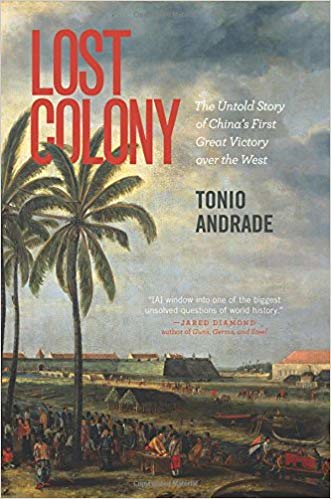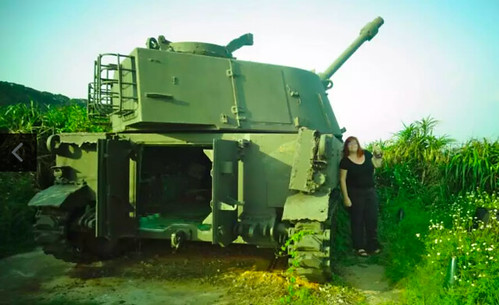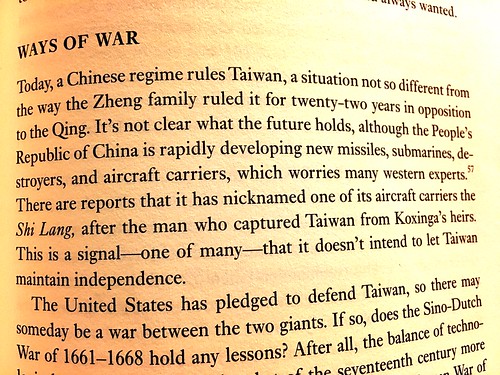 |
| Memes inside memes inside memes inside memes. A fractal of zombie memes. |
Some issues are difficult and complicated, and have no clear "good" answers. Others are clear-cut. Syria may be complex and difficult, but Taiwan? On that, the path forward is clear.
In recent weeks, talk of further intervention in Syria, punctuated by the recent airstrikes, has inspired countless memes - because you know that's totally an intellectually engaged way of communicating - which now march, seemingly of their own volition, across my Facebook feed. Of course these memes are not really self-propelled: they are shambling digital corpses animated by the clicks and likes of real people. They put on a show of being whole thoughts, but are not.
Because I'm a liberal who hangs around liberals, most of these half-formed wights express disagreement with any sort of intervention in Syria.
Of course, what worries me about these sans-serif haunted-meat memes about Syria isn't so much the question of intervening in Syria. My opinion that is something of a Newtonian liquid: hardening at times but subject to fluidity. I don't know enough about Syria to have a firmer opinion on it. Naw, what scares me is how easily I could see the same memes - possibly with the same pictures and text but "Syria" scratched out and "China" inserted - deployed in the event of US assistance to Taiwan, should it come under Chinese attack. What scares me more is that many of them will originate with the
50-cent troll army, but be animated and marched across Facebook by people like my friends. Good people spreading zombie memes opposing US assistance to Taiwan.
Of course, I won't see these eldritch memes for long, because I'll be dead.
More broadly, they express disagreement with the idea that the US should intervene in any international crisis, ever (though to their credit I can generally assume the people sharing these buzzing demi-thoughts do support strong refugee acceptance and settlement programs). They are isolationists - that's not a criticism, I'm just calling that perspective what it is - usually driven by two key worldviews:
1.) That the US cannot be trusted to do any good, and cannot be supported in any attempt to intervene in any international conflict, given our history of being unable to use our military might for good (at least since World War II), instead using it mostly to advance corporate/money-driven or power-driven interests. The US will never intervene for any other reason than to spread its selfish, people-killing empire.
2.) Intervening in any international conflict would create another quagmire the US cannot afford and will not be able to escape from, and will destroy the country in question in the same way that Afghanistan, Iraq and Vietnam were left in shambles, to name a few examples.
I won't deal with the first here - I agree with the sentiment to a great degree, yet not when it comes to Taiwan, and that deserves its own write-up. I'll tackle it later. Today, I'm focused on the second.
Even just a cursory brainstorming makes it clear to me that the "it will be a quagmire! We'll never get out! It will destroy the country!" line of thinking is simply incorrect when it comes to Taiwan. It is often true in other circumstances, and my support for Taiwan does not extend to support for what we did in Iraq.
Here are a few reasons why:
There’s a clear good guy and bad guy. China is the obvious aggressor, a dictatorship claiming a self-ruled, sovereign liberal democracy as its own on specious "historical" grounds and a frankly racist call to ethnicity (they might say "cultural and historical roots" but they really mean that they think Taiwan and China should be the same country because they are ethnically the same). In many other conflicts, there are no clear 'good guys' - look at Syria. There are good people around the world and in Syria who genuinely want something better for their country, but the only players in the war whom we might back, who might be installed as a government, are frankly awful. In Taiwan that's not the case. Our side is very clearly in the right. China wants to not just take Taiwan but delete its freedoms. This isn't "Assad or the rebels, who are also terrible?" This is more like "Europe vs. the Nazis". (The CCP aren't exactly Nazis but the comparison is warranted given their rampant human rights abuses, fascist Big Brother system and straight-up massacres, the comparison is warranted. And who doesn't love punching Nazis?)
What I'm saying is, this is a clear-cut case of dictatorship vs. democracy, self-ruled successful nation vs. expansionist aggressor.
In other conflicts, there was no clear government or path forward after US intervention. Taiwan is a developed democracy (unlike other countries which were turned into a quagmire upon deposing a dictator or junta) with an imperfect but basically successful government. There are clear institutions which, while imperfect, are not horrible and can rebuild. There is no need to replace it - there is no leadership crater left behind. It would be more like Europe rebuilding after WWII than the morass of Iraq.
Unlike in other conflicts, Taiwan actually wants the support. In fact, it's not fair to call it "intervention" - it would be assistance. They can already provide a good amount of military support themselves. Not only does the Taiwanese government want the assurance of assistance, the general consensus in Taiwan is that the people do, too. This isn't Iraq where nobody asked us for help but we barged in anyway, with no real plan. If you are asked for help, you aren't barging in. You aren't intervening. You are supporting and assisting. That's what it means to be an ally.
Taiwan is an important ally, and this isn't about oil. We're one of the US's top trading partners (not as big as China but still essential). We are a bastion of liberal democracy in Asia. We are one of the freest, if not the freest, country in Asia. We are geostrategically important. We are a key global supply chain player, and a lot of global technology runs through us (ever heard of TSMC? Foxconn?). We are ranked the 22nd biggest economy in the world by GDP by the IMF (other organizations don't keep data on Taiwan because China is a jerk about it.) We are developed. We are successful. We have a population similar to Australia's. We do matter. The US economy will take a hit if we go down, not least because we make the chips that run your smartphones. You don't think you'll feel it, but you will, far more than the results of any other conflict.
The US is doing one thing right already. They aren’t just showing up with bombs in Taiwan, nor should they. They are wisely stepping back (well...there’s an interesting discussion to be had here) while peace is maintained. There would only be a question of stepping in if China invaded. Not before. We aren't starting this war, we're stepping in to help an ally if and only if an aggressor attacks. Again, this is the right way to go about being a world leader.
It's actually the right thing to do. Yes, this makes me worried that the US won't do it. We never seem to do the right thing, at least not in my lifetime and not really in my parents' lifetimes either. But for once, we're on the right side! That's amazing and we shouldn't mess it up just because we've done wrong things before. If you get in a bar fight, feel bad about that and swear off fighting - dude, you still step in if you see someone about to get raped, even if it means a fight. "But I swore off fighting" doesn't put you in the right.
Destruction will happen whether we support Taiwan or not (so will casualties). That destruction will come from China, but it will still be destruction. Staying out of the conflict will not stop Taiwan from being destroyed (and if they want to use nuclear weapons - though I doubt they will - they'll do that regardless of whether the US gets involved). Yes, people will die, but people will die in the event of a CCP invasion, and will die under CCP dictatorship. Do you really think Taiwanese people will sit down, shut up and be force-fed a total lack of political freedom and human rights? 400,000 of us went downtown because we didn't like the way the government passed a trade pact. Take away our actual rights? And expect us to accept this? LOL, no. But if you fight the CCP you die or rot in jail.
Destruction is not the worst possible outcome. Destruction can be rebuilt from. CCP oppression is forever. Think of it more like “do we help Europe kick the Nazis out?” - the non-negotiable is kicking out Nazis, not peace and not preserving infrastructure. Destruction is an acceptable sacrifice. Ask most Taiwanese, and they'd rather have to rebuild roads and bridges than be ruled by the CCP.
Taiwan is better-equipped to rebuild. We are a developed, successful nation. We will need aid for a time, but it will be far more limited. We are not a black hole. We have resources and means. This isn't Iraq, Afghanistan or anywhere else that has turned into a horror story. Look at what Taiwan did, in the midst of Martial Law, coming off a massive decline from relative pre-war prosperity. We went from "economic basket case" to "Asian Tiger", and under a horrible dictator at that. It won't be fun, but we have the wherewithal to rebuild.
Taiwan wants peace. We give up a lot, not least our dignity, for peace already. The US assisting in the event of a Chinese invasion is an extreme worst-case scenario which Taiwan also doesn’t want. We're the ones who stand to suffer and sacrifice the most, and obviously we want to minimize the pain. It’s not a country of various groups hell-bent on destruction - we have strong democratic norms in place already. Given that the people and government do want peace and can rebuild, intervention could be limited and short. Nobody here wants war, and so we want that war to end. It won't be an eternal horror show of rebels and gangs driving around shooting things up.
The main goal (and the US is actually right this time) is not war but deterrence. What I - and Taiwan - really want is to avoid this whole scenario by convincing China that Taiwan isn’t worth a fight. But we only get that if we can actually make it look like a fight. We only get THAT by allies that pose a real threat voicing a commitment to assisting Taiwan. It’s a fine line but we’ve done it so far. China cannot be negotiated with on this. This is all the CCP understands when it comes to Taiwan.
This is a real situation, not an abstraction. I am not joking when I say I personally could die. It demands real solutions. Nobody here actually wants this to happen but we need to consider what is available to us, not what we’d like. I doubt many Taiwanese actually want to rely on the US for assistance, and many - including many pro-independence and Third Force thought leaders - are just as disgusted by the horrors and excesses of US global hegemony as I am, and my Western liberal friends are. But if China invades and no better option exists, we must take the best one available to us, imperfect as it is. At that point there is no time for ideology or soapboxing: the non-negotiable isn't "but the US is horrible", it's "we are going to die and if the CCP wins it's literally game over." There is no "but we'll protest!" - no, you'll die. There is no "we'll keep fighting" - you will, because that's what Taiwanese do when they want something better - but you will lose and also die. "We'll refuse to be ruled by them!" Yup - I guess the CCP can't rule you if you are dead. "We'll occupy" - and die. If you don't believe me, ask people from Tiananmen - - oh wait, you can't, because they are dead.
(OK they're not all dead, but enough of them are to make my point.)
This is real life, and in real life there is a time for ideology, and a time to look at your real choices and decide what your non-negotiables are. If your non-negotiable is that the CCP can't win - and it really should be - you have to take options you don't like. If your non-negotiable is not accepting aid from an evil hegemon, then congratulations, you're about to be ruled (or just killed) by an even more evil hegemon.
It doesn't have to take away from benefits to US citizens. Really! Our military spending, just from a quick Google, is upwards of $600 billion. China's is estimated to be maybe half that, upwards of $200 billion (not that we actually know anything about China, so this is an educated guess). I am not a military or defense analyst, so I won't belabor this point, but there are a lot of numbers between $200 and $600 billion where we'd still have the best-funded military in the world and still be capable of a stronger military than China. We could cut our budget in half and still have better funding. (If any actual analysts think I'm wrong, please weigh in).





